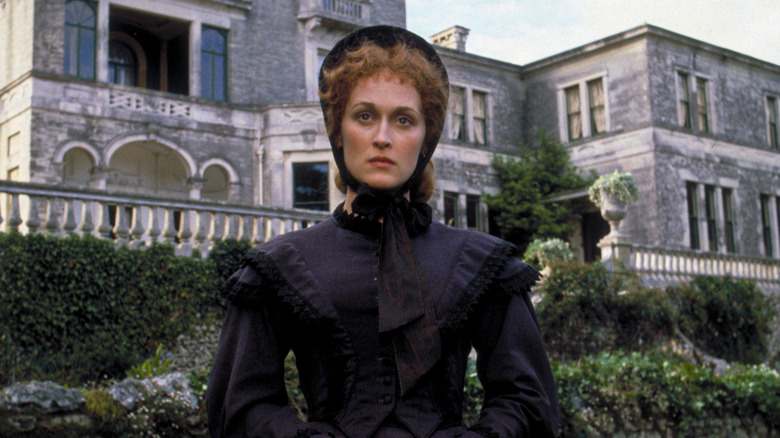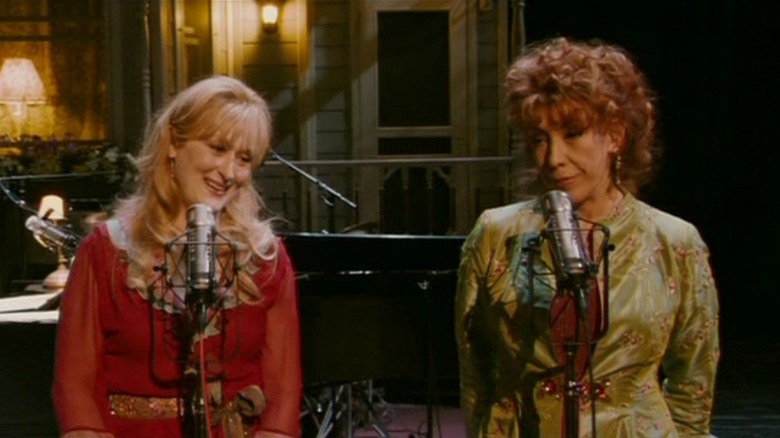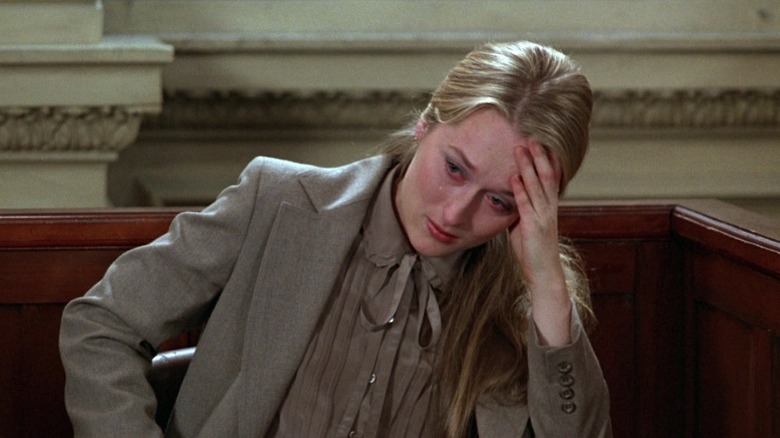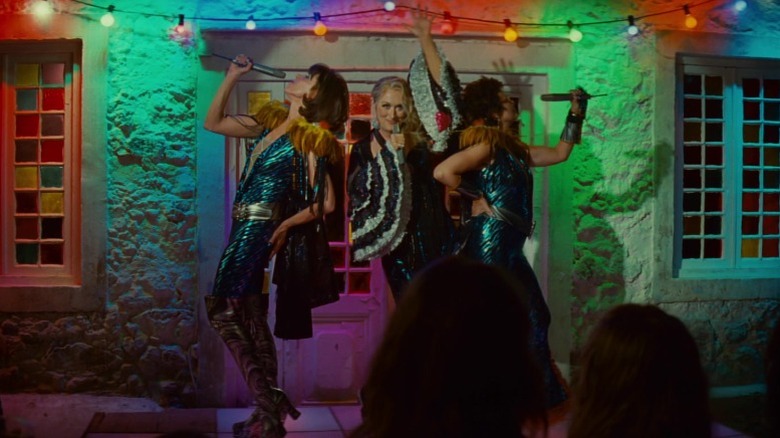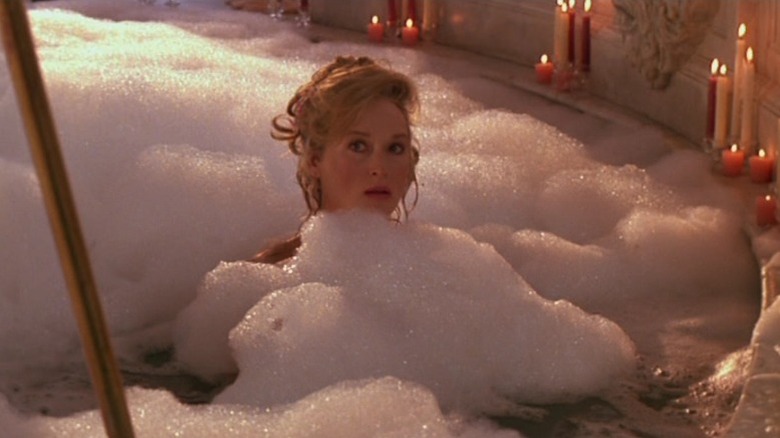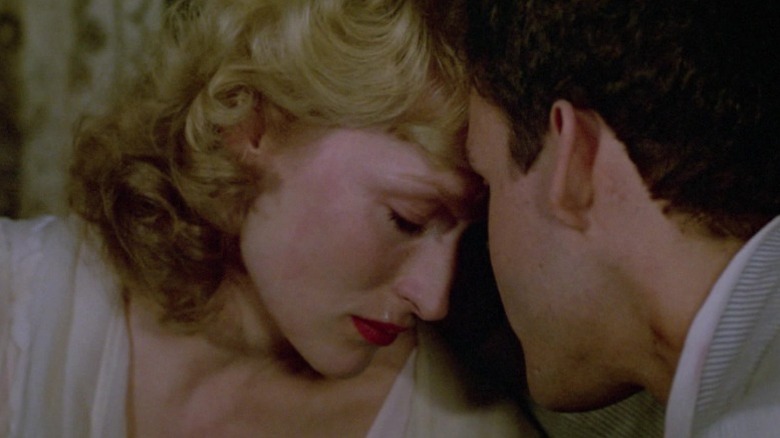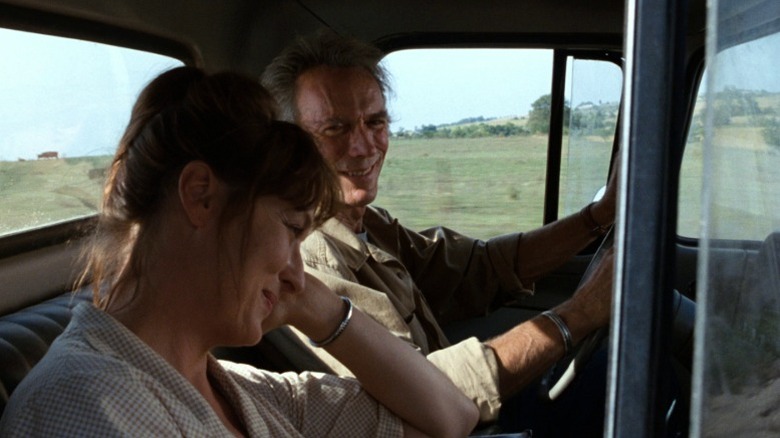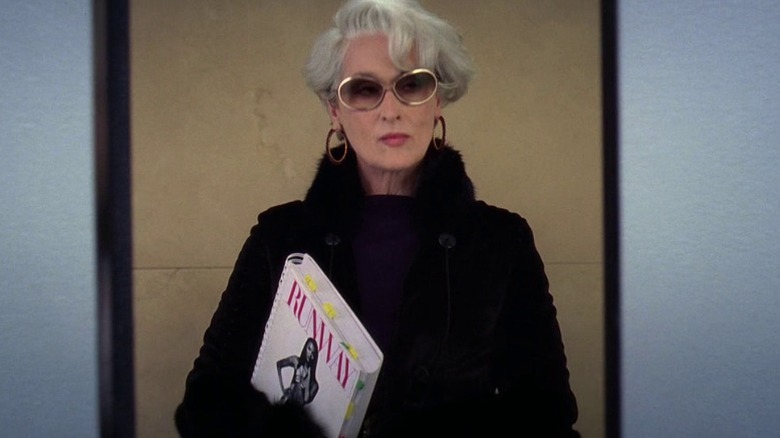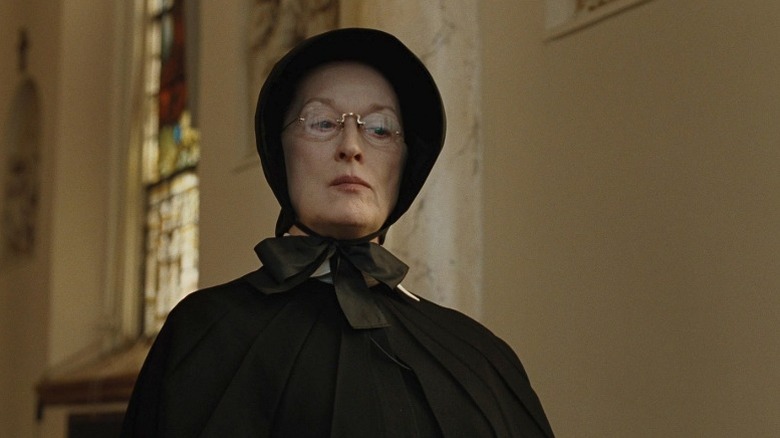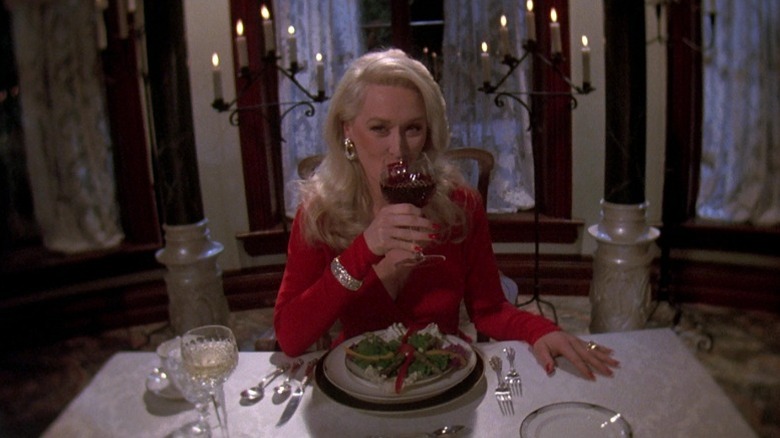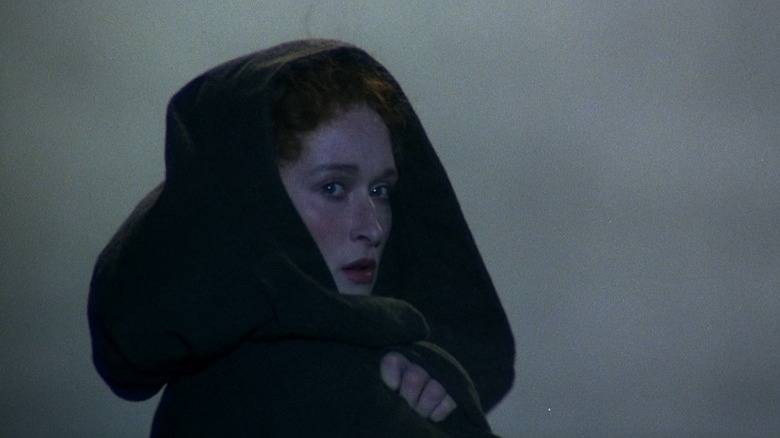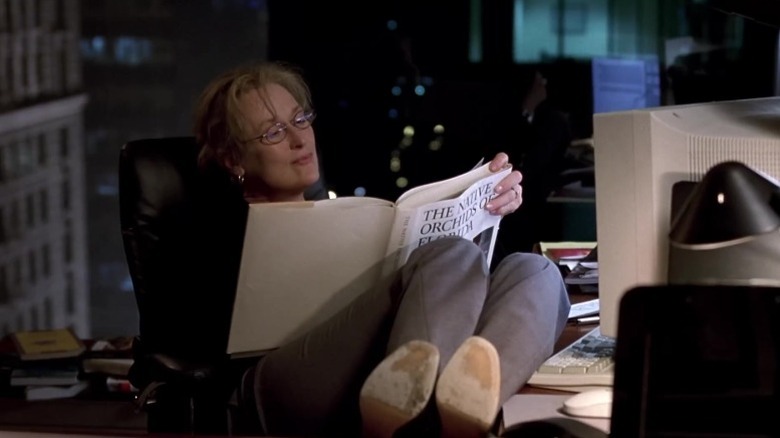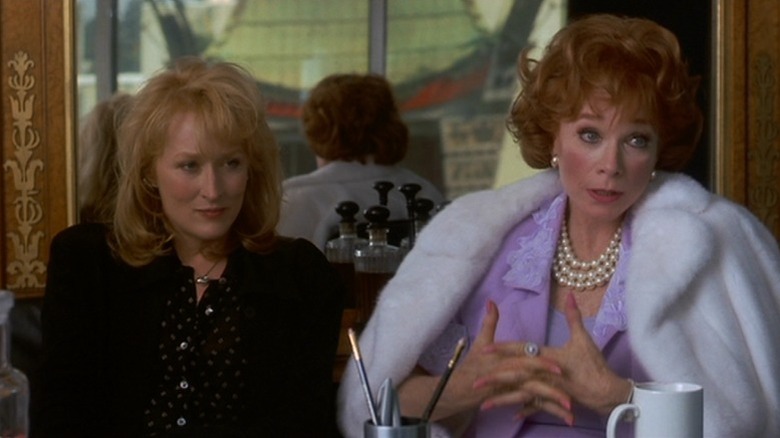12 Best Meryl Streep Movies, Ranked
It may well be the case that no other screen performer in history was ever as culturally synonymous with the concept of a "great actress" as Meryl Streep. The record holder for most Academy Award nominations as an actor has put in so many great performances across such a broad spectrum of tones, genres, and character types that it's almost hard to fathom. On top of that, Streep is savvy about picking her projects, and has amassed a stunning list of credits over her 48 years as a movie and television actor.
Here, we've compiled a ranking of the 12 best Meryl Streep movies, going by both the quality of the films themselves and their relevance as defining pieces in the Meryl Streep canon. This means that we've favored some more underrated choices over a few acclaimed films in which Streep plays relatively small parts, such as "Little Women" and "Manhattan." You'll find that there's something for everyone in the roster; if ever there was an actor whose career was endlessly delightful and rewarding to follow, it's Meryl Streep.
12. A Prairie Home Companion
Robert Altman had a way of drawing the best out of some of the greatest performers in film history, but even though he and Meryl Streep both had their Hollywood breakthroughs in the 1970s, they didn't work together until Altman's very last film: 2006's "A Prairie Home Companion." It's one of the best films in the respective careers of those two legends of American cinema.
Like many an Altman film, "A Prairie Home Companion" is an ensemble film that follows a number of different characters, but Streep is among the cast's most prominent figures. A fictionalized snapshot of the behind-the-scenes goings-on at the eponymous weekly Minnesota radio show, the movie was written by the show's creator and host, Garrison Keillor, and teems with the usual fine-grain detail of Altman's community portraits. The plot follows the efforts of the show's cast and crew to put on its final broadcast, and Streep plays Yolanda Johnson, one of the three singing Johnson Girls alongside her sister Rhonda (Lily Tomlin) and daughter Lola (Lindsay Lohan). It's a warm, delicate, exuberantly funny swan song for Altman that finds him at the very top of his game, and it's a true gift to get to see Streep chew into his naturalistic style.
11. Kramer vs. Kramer
Written and directed by Robert Benton, "Kramer vs. Kramer" was the biggest box office phenomenon of 1979: A small, modest $8 million family drama that became the year's highest grosser in the U.S. and Canada, amassed over $170 million worldwide, and won best picture plus four additional Oscars. Among those Oscars was a best supporting actress laurel for Meryl Streep in the second nomination of her career. There's an argument to be made for "Kramer vs. Kramer" as the movie that first launched the Meryl Streep mythos into the stratosphere.
In the film's fraught, realistic, deeply touching divorce drama, Streep plays Joanna Kramer, née Stern, a woman who realizes eight years into her marriage that she's deeply unhappy with her life and feels like a stranger to herself. She separates from her husband Ted (Dustin Hoffman), leaving their son Billy (Justin Henry) in his care, but eventually settling down enough to feel ready to take on full-time parenting duties. By then, however, Ted has gotten used to being Billy's caretaker, and a bitter custody battle is initiated — one in which everybody has their own fair, legitimate reasons for what they want, no easy solutions are available, and both adults are faced with the inevitability of hurting their child to some degree. While the film's gender politics have aged somewhat, it remains one of the most indelible character dramas to have emerged from the fertile soils of New Hollywood.
10. Mamma Mia
Meryl Streep has done her share of breezy, infectiously entertaining movies throughout her nearly 50-year film career, but no other entry in her oeuvre is as much of an injection of pure, unmitigated, irresistible fun as "Mamma Mia." A 2008 Phyllida Lloyd-directed adaptation of the Broadway jukebox musical featuring all ABBA songs, "Mamma Mia" was buoyed by Streep's incandescent leading performance into becoming the highest-grossing movie of her career. She was the perfect anchor for a movie that needed a boundlessly lovable, charismatic, and versatile presence at its center — someone who could beckon audiences with her warm familiarity while still surprising them with her willingness to throw herself fully into the razzle-dazzle.
Streep plays Donna Sheridan, the anxious, put-upon owner of a struggling hotel on the Greek seaside. Unbeknownst to her, her daughter Sophie (Amanda Seyfried) has invited three former flings of Donna's to her upcoming wedding, in hopes of determining which one is her dad. A series of romantic misadventures, nostalgic reminiscences, and vibrant song-and-dance numbers ensue against the breathtaking Mediterranean backdrop, with Streep both grounding the whole enterprise and allowing it to achieve liftoff. More than in any other role she's tackled, you get the sense that she's having the absolute time of her life — and the incredible supporting cast meets her at that same level every step of the way.
9. She-Devil
Arguably the most underrated film of Meryl Streep's career, Susan Seidelman's "She-Devil" was released in 1989 to little critical or commercial fanfare. But, in retrospect, it's the kind of movie that might have been just too ahead of its time: A proto-feminist "Death Becomes Her" precursor that both relishes in and shrewdly subverts female rivalry tropes, while delivering oodles of socially observant and cartoony humor alike.
The ostensible star is Roseanne Barr, in a typically broad but thoroughly serviceable performance, which might account for why the film enjoys relatively little cult prestige even today. But really, it's Meryl's show all the way: In the role of novelist Mary Fisher, she manages the feat of exuding lush, decadent glamour and larger-than-life diva-ness while simultaneously sending up and mining every possible drop of humor. Her performance is an all-time achievement in high camp, which serves "She-Devil" just right, as the film's plot — an underestimated housewife (Barr) vows revenge on her husband (Ed Begley Jr.) after he leaves her for a best-selling romance author (Streep) — indeed calls for a foil of ethereal presence and note-perfect sense of humor. The whole movie is hilarious and sharp, and Seidelman shoots it with a level of panache and genuine understanding of cinematic language that feels downright nostalgic next to today's indifferently-directed studio comedies.
8. Sophie's Choice
Ask any Meryl Streep fan what's the defining performance of her career, and there's a good chance the answer will be "Sophie's Choice." The 1982 Alan J. Pakula film has somewhat fallen out of critical favor in the intervening decades, but it remains an indelible testament to the depths of feeling and raw intensity that Streep is capable of accessing as a dramatic actor. And, thanks to the combined talents of Streep and fellow stars Kevin Kline and Peter MacNicol, the movie's dark, blisteringly human historical drama still packs a mighty wallop.
Based on the eponymous 1979 William Styron novel, "Sophie's Choice" tells the story of Zofia "Sophie" Zawistowska, a Polish immigrant living in New York City in 1947. Although the film begins with her striking a connection with friendly young novelist Stingo (MacNicol), Sophie spends much of the film in a tempestuous relationship with Nathan Landau (Kline), who is enormously possessive and abusive towards her. Stingo doesn't know at first, but Sophie is besieged by the specter of her deeply traumatic years as a prisoner in Auschwitz — including the harrowing, unfathomable secret that gives the film its title (and which we won't spoil, even though it's well known in popular culture, lest you be unfamiliar with it). It's one of the most haunted and emotionally volatile roles of Streep's career, and she plays it without a single false note.
7. The Bridges of Madison County
No film finds Clint Eastwood in a more sincere and open-hearted mode as either director or actor than "The Bridges of Madison County." With a screenplay by Richard LaGravenese based on the eponymous novel by Robert James Waller, the 1995 movie manages to make one of cinema's saddest, most stirring love stories out of just four days of acquaintance between two former strangers.
That time is plenty, as it turns out, for Eastwood and Meryl Streep to persuade viewers of an earth-shattering, existentially jolting passion between National Geographic photojournalist Robert Kincaid and Italian World War II war bride Francesca Johnson. Robert meets Francesca after arriving to Madison County, Iowa, on an assignment to photograph its historical covered bridges. With her husband and two children away at a state fair, Francesca is all alone — and, as she and Robert grow closer, it emerges that she also feels alone in her marriage, yet can't bring herself to leave it.
The film evokes 1965 small-town Iowa with the degree of texture and affection that has come to be expected of Eastwood, and LaGravenese's script is masterful in its exploration of the psychological maelstrom wrought by yearning and resignation. But in the end, it all comes down to a perfect duet between two great actors, and, if Eastwood turns up at his most startlingly vulnerable, Streep is downright titanic in the role.
6. The Devil Wears Prada
By 2006, it seemed that the public had a pretty good grip on what Meryl Streep was capable of as an actress. But, as ever, she showed that she had even more in store than the world thought, by starring in "The Devil Wears Prada" — a film that found her thoroughly transforming herself into one of the most towering characters of her career.
In some ways a precursor to J.K. Simmons' Oscar-winning turn in "Whiplash," Streep's Miranda Priestly is the ruthless emperor at the helm of the fictional Runway fashion magazine, which becomes a purgatory for fledgling journalism career Andrea "Andy" Sachs (Anne Hathaway). Andy knows and cares nothing about fashion, and takes a job as Miranda's assistant as an intended stopgap between college and greener, more respectable pastures. Yet she soon finds herself fascinated by the world of haute couture and swept into the draining, exhausting, boot-camp-esque rhythms of the Runway office, with Miranda emerging as both her worst nightmare and a begrudging mentor.
The whole film is an iconic artifact of 2000s pop culture, and even better than it's given credit for. Nobody knew it at the time, but it was one of the last gasps of smart, fine-tuned, financially prosperous character drama in Hollywood. And, while others might have turned the role into a broad caricature, Streep was so attuned to Miranda's various depths and shades that she even improvised a line that changed "The Devil Wears Prada" forever.
5. Doubt
There are some instances when a film being strongly reminiscent of a play can be a liability, but not so with John Patrick Shanley's "Doubt," which never really tries to disguise its roots as a Tony- and Pulitzer-winning stage production — and is all the better for it. The movie unfolds largely in close quarters, through extended conversation scenes and occasional impassioned monologues, trusting the weight of the text and the talent of the actors to carry things. And, with the text being as great as it is, and the actors being Meryl Streep, Philip Seymour Hoffman, Amy Adams, and Viola Davis, you can imagine the strength of the result.
Streep plays Sister Aloysius Beauvier, the strict and traditional principal of a parish school in the Bronx in 1964. She begins to suspect that Father Brendan Flynn (Hoffman) may be sexually abusing altar boy Donald Miller (Joseph Foster), the school's first — and thus far only — Black student. What starts out as a procedural investigation soon becomes a full-fledged power struggle between the school and the church's two utmost authorities — which in turn reflects a number of existential struggles occurring within the Catholic Church and the United States at large in the mid-20th century. Shanley's play is a masterpiece of complexity and gathering tempestuousness, and he lets it breathe fully on the screen, allowing the duel between Streep and Hoffman to accrue all the startling greatness both legends can give it.
4. Death Becomes Her
Meryl Streep is perpetually underrated as a comedy star – her casting in "The Devil Wears Prada" even originally faced criticism for that very reason. But the absence of horror in her filmography is even more flagrant: Of all her films, only Robert Benton's "Still of the Night" and Robert Zemeckis' "Death Becomes Her" could really be classified as horror. The latter, as a 1992 Meryl Streep horror comedy, is a double rarity. On top of that, it's one of the very best movies of Streep's career — and sneakily one of her best-ever acting showcases, too.
Fascinatingly similar to "She-Devil" in its overarching design — once again, Streep plays a glamorous woman who snatches away another woman's husband and prompts her to vow revenge — "Death Becomes Her" is differentiated by its loopy fantasy element. A satire of Beverly Hills decadence and youth obsession, the film pits actress Madeline Ashton (Streep) and writer Helen Sharp (Goldie Hawn, in one of her most memorable movies) as rivals for the affection of plastic surgeon Dr. Ernest Menville (Bruce Willis). But the two are united in dealing with the unforeseen consequences of taking an eternal youth potion supplied by the mysterious Lisle Von Rhuman (Isabella Rossellini). It's not a camp classic and a staple of pop culture for nothing: Endlessly hilarious and surprising, "Death Becomes Her" finds Zemeckis and all four actors in top form. Especially Streep, who sinks her teeth into the juiciest, goofiest, most boisterous comedic role of her career.
3. The French Lieutenant's Woman
Maybe the film with the most arthouse cred to have ever featured Meryl Streep in a leading role, "The French Lieutenant's Woman" was adapted by Harold Pinter from the acclaimed postmodernist novel by John Fowles, and directed by British cinema legend Karel Reisz. Much like the novel, the film follows a metafictional structure, simultaneously telling of the Victorian romance between a paleontologist and an independent woman, and of the tryst that develops between the two actors playing them in a movie — with the two parties in both stories played by Meryl Streep and Jeremy Irons.
This is the sort of movie where the less is said about it, the better. Suffice it to say that the combined talents of Reisz, Pinter, Irons, and Streep make "The French Lieutenant's Woman" one of the most original, engrossing, and mind-bending films of the 1980s. Even as it asks labyrinthine questions about art, identity, performance, and the nature of fiction, and plays myriad games with its own self-disassembling premise, the film remains a heartrending double love story that Streep and Irons infuse with scorching, can't-look-away chemistry. There's no other Meryl Streep movie quite like it — no other movie, period, really.
2. Adaptation
Speaking of metafictional movies about stories-within-stories and films-within-films, Meryl Streep went back to a similar well two decades after "The French Lieutenant's Woman" when she starred in Spike Jonze's "Adaptation" — based on, but not named after, the nonfiction book "The Orchid Thief" by Susan Orlean. Instead of taking the name of its source material, "Adaptation" is aptly named after the efforts of screenwriter Charlie Kaufman to make a viable film script out of Orlean's book. In fact, "Adaptation" goes so far as to dramatize those efforts — it is, in effect, a movie about its own pained, sweaty creation.
Nicolas Cage stars as twin brothers Charlie and Donald Kaufman (the former real, the latter fictional, both credited as writers of the film), who butt heads while Charlie is struggling to bang out a faithful adaptation of Orlean's celebrated foray into the world of orchid poaching in south Florida. Meanwhile, we also follow the movie that Charlie is struggling to write: The (ostensible) story of Susan Orlean (Streep) meeting and experiencing a transformative connection with eccentric horticulturist John Laroche (Chris Cooper). Both halves of the movie shine on their own, and when they finally dovetail, what we get is brilliant, hallucinatory, bracingly hilarious stuff — with Streep getting the opportunity to relish both detailed character work and some of the most relaxed, delightful comedy of her career.
1. Postcards from the Edge
It's no secret to anyone that Carrie Fisher was one of the smartest, funniest, most talented people to have ever walked the Earth, but not enough is said about her incredible work as a movie screenwriter. In 1997, she wrote one of the most memorable scenes in "Anastasia;" years earlier, Fisher adapted her own semi-autobiographical novel, "Postcards from the Edge," into a feature film that similarly mined her relationship with her mother Debbie Reynolds for great depths of humor and pathos. With direction from Mike Nichols, the movie version of "Postcards from the Edge" became the quintessential Meryl Streep film, the one that best encapsulates her career and her vast arsenal of talents.
What makes it so perfect as a summation of Streep is that it finds her deftly balancing her uncanny ability to inhabit dramatic characters and her knack for raucous, misbehaving comedy. She plays actress Suzanne Vale, fresh out of rehab and forced to move back in with her self-absorbed mother and fellow actress Doris Mann (Shirley MacLaine) in order to rebuild her career. Streep's performance both mocks and earnestly embodies the pitfalls of Hollywood superstardom, creating a character so expansive and fascinating as to almost defy belief — if not for the knowledge that she was the brainchild of Carrie Fisher. "Postcards from the Edge" is a perfect family drama, unassuming yet enormously wise and incisive, that doubles as a momentous meeting of two acting titans at their absolute best.
